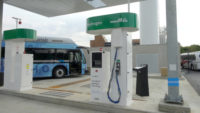A sprawling reservation in southern Ohio long associated with the nuclear industry has been selected as the site for construction of Ohio’s third nuclear powerplant. If the project goes forward, it will be one of only a few nuclear plants in the U.S. proposed for a greenfield site.
Duke Energy, Charlotte, N.C.; AREVA and USEC Inc., both of Bethesda, Md.; UniStar Nuclear Energy, Baltimore; and the Southern Ohio Diversification Initiative, Piketon, Ohio, have formed an alliance to develop the country’s first so-called Clean Energy Park on the site in Piketon where USEC’s Portsmouth Gaseous-Diffusion Plant enriched uranium for powerplant fuel rods until 2001.
Beyond announcing the alliance and selecting the site, little has been definitely decided, sources say. “There is no time line yet; it’s very early in the project,” says Rita Sipe, Duke spokeswoman.
As the utility that would operate the plant, Duke will provide overall project oversight. “The alliance will submit a proposal to the Dept. of Energy to develop a Clean Energy Park with an option for a new nuclear plant,” she says.
The plan currently calls for one reactor on the site. AREVA makes the 1,600-MW U.S. EPR, an adapted version of its Generation III+ EPR used in Europe, and French AREVA officials say the company has begun negotiations with Duke and UniStar “to develop an EPR reactor” for the site. AREVA has applied to the Nuclear Regulatory Commission for design certification of the U.S. EPR, says Laura Eifler, UniStar spokeswoman.
USEC leases a large portion of the 3,700-acre site from DOE and will support the alliance with its knowledge of the site, says Sipe. Bechtel Power Corp., Frederick, Md., is a strategic partner of UniStar for design and construction of the UniStar consortium’s plants but has not been named as the contractor for the Piketon plant. UniStar is composed of Baltimore-based Constellation Energy and AREVA.
The Clean Energy Park is a DOE initiative to convert former weapons sites to peaceful power generation. The alliance will request DOE assistance for funding of the initial phase and apply for an early site permit, says Sipe. The goal is operation in 2020.


Post a comment to this article
Report Abusive Comment